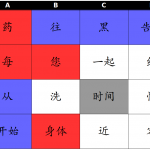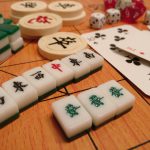Articles in the ‘Learning outside class’ category Page 15
-
Let’s play 迷霧中 (Into the Haze)
Let’s play 迷霧中 (Into the Haze)! In this post, I share a video where I play a small part of the game, summarising and commenting on what’s going on in English (the game is of course in Mandarin).
Read → -
Learning (or not learning) Chinese slang
Learning slang in Chinese can be fun, but it’s worth remembering that in most situations, it’s actually much less useful than more standard ways of expression. Slang is used in a limited context and changes quickly.
Read → -
Playing Codenames to learn Chinese and other languages
Codenames is one of my favourite games, and it also happens to be an excellent game for language learning! In this article, I suggest ways of playing it in Chines, along with a tool that generates grids of code words for direct use in the classroom or elsewhere!
Read → -
Into the Haze: A new text adventure game for Chinese learners
Into the Haze is an interactive text adventure game for Chinese learners. Your brother is missing and you need to enter a city covered in a poisonous haze to find him. The story is presented through text and audio, and depending on your choices, the game will develop differently. If you make bad choices, perhaps because you didn’t fully understand the options, you might fail and will have to try again. Good luck!
Read → -
10 ways of using games to learn and teach Chinese
Games are great for learning languages. Here are ten ways you can use games to learn or teach Chinese as a second language!
Read → -
A student’s guide to comprehension-based learning
In this third and final article, the focus is on how students can make their own learning comprehension-based, with or without a teacher. It draws from the principles and ideas of the previous articles and allows you to apply these to your own learning.
Read → -
Learn Chinese implicitly through exposure with a seasoning of explicit instruction
Should you learn Chinese implicitly through exposure and usage, or explicitly through description and instruction? The answer is that adults need both, but that explicit learning is often used too much.
Read → -
Transcribing Chinese audio as an active form of listening practice
Transcribing audio is a very active method of practising listening ability that encourages you to pay attention to detail. It works for all proficiency levels and is a great weapon in your arsenal to conquer Chinese listening ability.
Read → -
Accessing Chinese culture through cartoons
Accessing Chinese culture can be very hard if you go through the original stories or written versions. If you go through cartoons online, however, it not only becomes easier, it’s also more fun!
Read → -
Don’t forget to consolidate the Chinese you have already studied
Learning new things is important, but sometimes it’s more important to focus on things you have already studied. This article is about how to consolidate the Chinese you have already conquered.
Read →









